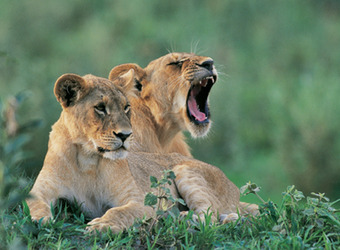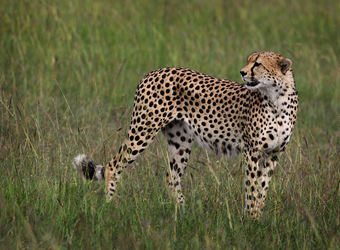Maasai Mara Nat'l Reserve
| Read Reviews | Write a Review Start Planning Your Custom Safari
 view larger image
view larger image
The famed Maasai Mara is one of Africa’s most acclaimed wildlife reserves, renowned for its wildebeest migration, prides of lion and huge herds of plains animals. The Mara is the northern portion of the Serengeti Plains, and we find excellent wildlife viewing all year long in these grasslands. The reserve is named for the Maasai tribespeople, the traditional inhabitants of the area who graze cattle here, and the Mara River that runs through it.
 view image gallery
view image gallery
The Safari Experience
Comprised of the 64-year old Mara Reserve, now called the Mara Triangle, as well as the extended Maasai Mara National Reserve and a perimeter of highly conservation-focused private conservancies, the greater Maasai Mara is known for its dense wildlife population, documented in popular TV shows like BBC’s Big Cat Diary, and its annual wildebeest migration. Accommodations include traditional mobile tented camps; comfortable, often luxurious semi-permanent safari camps; and more modern lodges. Within the national reserve and Mara Triangle, activities focus on morning and afternoon wildlife drives by 4x4 vehicle, which is a great complement to the off-road wildlife drives, guided bush walks, night drives and cultural experiences offered in the private conservancies. A combination of stays inside the reserve and outside it within a private conservancy is highly recommended, for the most comprehensive experience. See camp descriptions for precise locations and activities offered.
 view image gallery
view image gallery
Wildlife
The Maasai Mara is lauded for its large populations of lion, leopard and cheetah, dense herds of plains game, and the famous annual migration of about 1.8 million wildebeest, zebra and Thomson’s gazelle traversing the Serengeti Plains ecosystem in search of fresh grasses. These herds cross the Mara River as they move into this area between July and October, a sought-after safari event that pits hoofed game against gigantic Nile crocodiles. There is also a smaller migration of about 800,000 wildebeest that come from the adjacent Loita Hills. Yet the migration is a mere fraction of the wildlife interest here. Beyond the famous big cats, local Maasai giraffe are the tallest land mammals in the world. There are elephant, buffalo, and black rhino, although the rhino population is quite small and growing. Hippo and crocodile are found in the Mara and Talek rivers, and more than 470 bird species have been identified.
 view image gallery
view image gallery
How to Include the Maasai Mara in Your Safari Itinerary
Recommended Number of Nights
Nature Travelers: 3 nights in the Maasai Mara National Reserve and 2-3 nights in a private conservancy
Photographers: 3-4 nights near the Mara Triangle and 3 nights in a private conservancy
Families: 2 nights in the Maasai Mara National Reserve and 3 nights in a private conservancy
Active Travelers: 2 nights in the Maasai Mara National Reserve and 3 nights in a private conservancy
Other Regions to Include
The Maasai Mara is the quintessential safari destination, with open savanna and enormous herds of wildlife. While it can stand alone for a safari, it makes sense to combine it with Laikipia or Lewa Wildlife Conservancy, a rhino sanctuary. This area is also home to unique sub-species such as the endangered Grevy’s zebra, reticulated giraffe, gerenuk and Somali ostrich. While these animals are also found in Samburu National Reserve and other areas in northern Kenya, they do not exist farther south. Amboseli National Park in the southeast corner of Kenya is known for its great herds of elephant that congregate around the lush marsh here. Amboseli is also a great spot from which to view Mount Kilimanjaro towering in the distance. Tanzania’s iconic stops, such as the Ngorongoro Crater, Lake Manyara and Tarangire National Park are easy additions, as is a visit to the mountain gorillas in Uganda or Rwanda.
